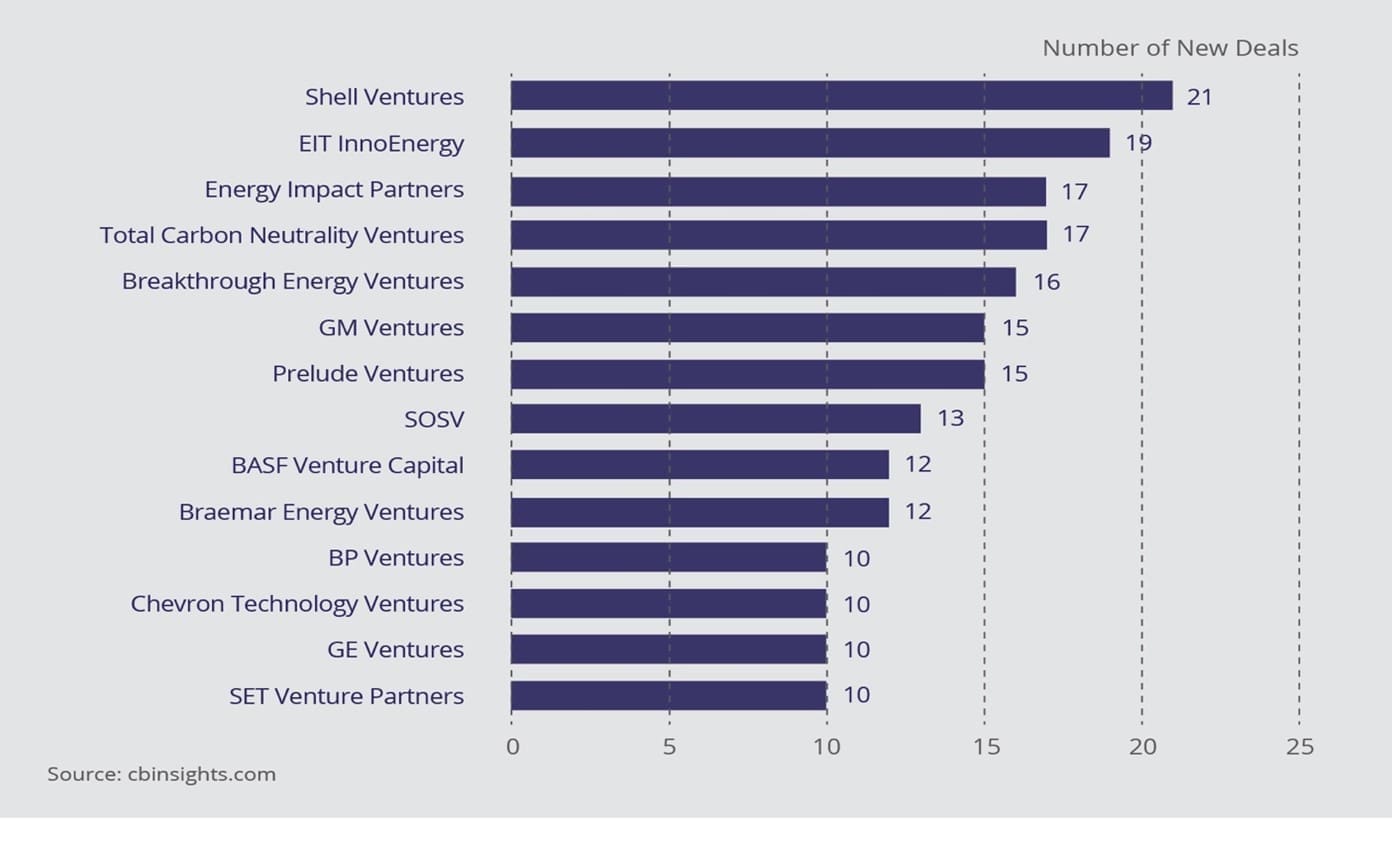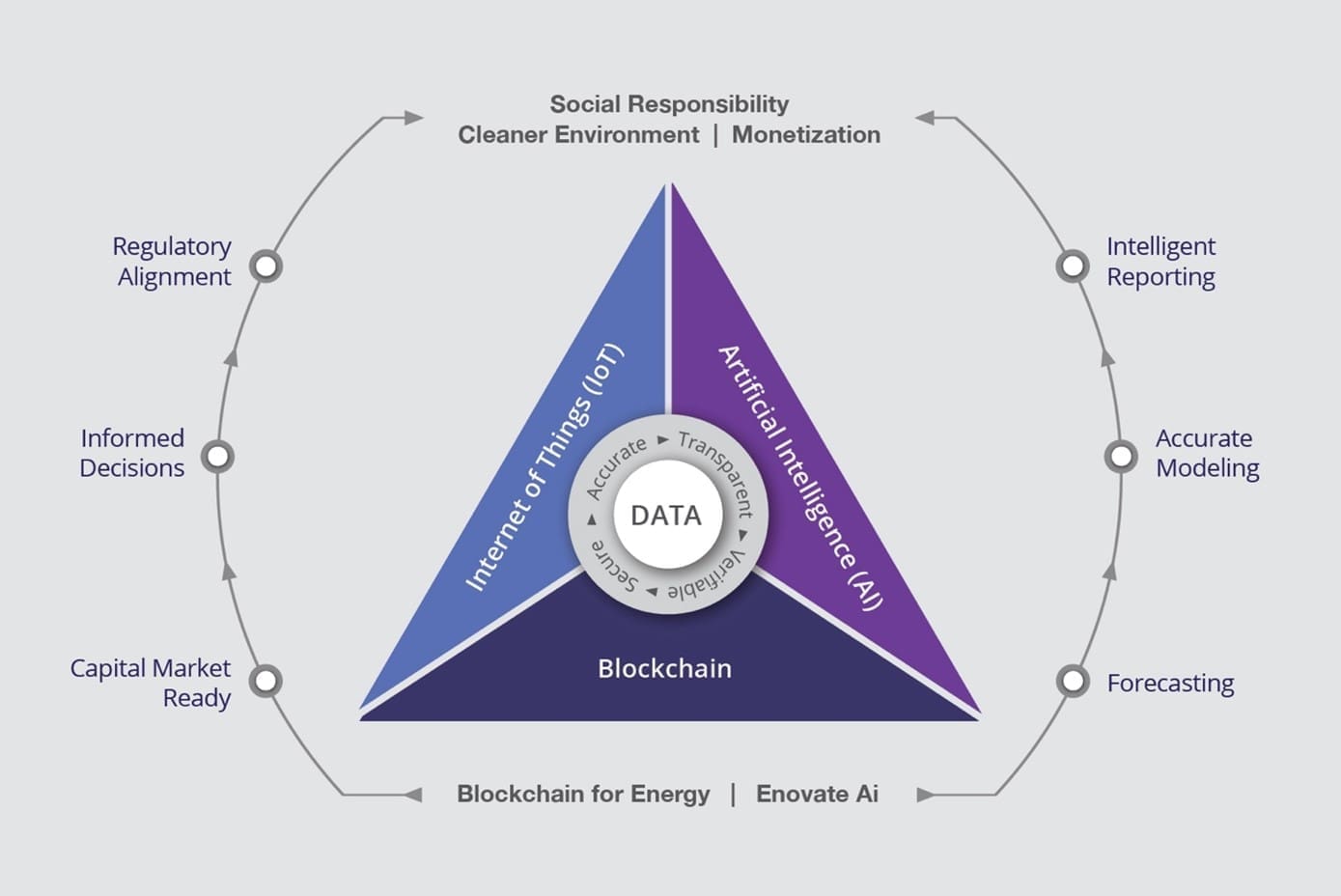Change is upon us. The industry must adapt to ensure it keeps pace with ever-evolving requirements and governmental regulations whilst attempting to balance the narrative in the court of public opinion.
Embracing new technologies allows us to drive a successful path forward, manifesting our own course to meet stringent new regulations and exceed expectations in combating carbon emissions.
Securing the future of our energy supply and our industry
Embracing technological advancements and utilizing them to industry advantage can help push the status quo threshold – the effects of which are yet to be fully realized and cannot be understated.
In the global energy landscape, several interconnected factors stand out as pivotal influencers of industry dynamics and policy making. Among these, AI (Artificial Intelligence), Blockchain, and IoT (Internet of Things) are emerging as a nexus of critical considerations.
AI: Optimizing energy production and distribution
AI can play a pivotal role in optimizing energy production, distribution, and consumption. AI-driven predictive analytics can forecast energy demand patterns, enabling schedule adjustments and optimization of resource allocation, minimizing wastage and reducing costs.
Blockchain: Disrupting energy markets and transactions
Blockchain technology offers decentralized, transparent, and tamper-proof ledgers for recording transactions. Smart contracts, powered by blockchain, automate these transactions, ensuring secure and transparent agreements between parties. In addition, trust and transparency with environmental claims and transactions are enhanced, which increases stakeholder support.
IoT: Reshaping energy infrastructure and efficiency
IoT revolutionizes energy systems by interconnecting devices, sensors, and infrastructure to collect and analyze vast amounts of data in real-time. This creates accurate processes that enable faster payments, empowers greater decision-making and significantly reduces service-to-payment times.
Aligning innovation with regulatory guidelines
Collaborative efforts between governments, industry stakeholders, standards boards and technology innovators are crucial to addressing these challenges and driving responsible energy transformations. The intersection of IoT, Blockchain, AI, and U.S. policy stands as a focal point in addressing the world’s most pressing energy issues. By leveraging technology advancements and informed policy decisions, we can navigate towards a more sustainable, efficient, and resilient energy future.
U.S. policy: Strengths, weaknesses and opportunities
U.S. policy decisions exert significant influence on global energy markets and their developments in new technology. Regulatory frameworks, tax incentives, and government-funded research programs play a crucial role in shaping energy priorities.
The U.S. Energy Department’s initiatives support research and development in renewable energy, grid modernization, and advanced energy technologies. Policies aimed at promoting clean energy adoption, reducing carbon emissions, and enhancing energy security have far-reaching implications for global energy transitions.
New standards call for a new way forward
Policies are shaping new standards that the energy industry must meet in a transparent and irrefutable way.
For example, in March, the U.S. Securities and Exchange Commission approved new requirements that public companies disclose their greenhouse gas emissions.
After a global review of efforts to address climate change during the 2023 United Nations Climate Change Conference (COP28), world leaders determined actions must be accelerated. This includes a call on governments to speed up the transition away from fossil fuels to renewables such as wind and solar power in their next round of climate commitments.
These examples show that the industry is at a pivotal moment and harnessing digital technology ensures not just survival, but the opportunity to thrive

The wholly verifiable data provided by solutions such as AI, Blockchain, and IoT can help businesses meet the requirements for accurate, transparent, and verifiable information today.
Embracing the future of the industry (and reaping the benefits)
As an industry, we are already adapting – developing and deploying comprehensive solutions that leverage these new systems.
As an example, Blockchain for Energy (a non-profit consortium of energy industry experts) has recently released B4E Carbon. It’s an emissions management solution developed for the energy industry by the energy industry and powered using technology developed by Enovate AI. The solution provides an intelligent and ultra-secure digital framework for data-driven validation processes of environmental claims in alignment with regulatory bodies and capital markets. It is available on a secure industry-approved platform and is used by a growing list of industry heavyweights.

B4E Carbon simplifies and automates mandatory EPA reporting. It is a vital tool for transparency and collaboration, data management, real-time monitoring, validation and verification – and claims reversal prevention.
When platforms like this are developed with industry standards and collaboration in mind, the result is greater transparency among stakeholders.
Results that speak for themselves
The industry has an urgent need for accurate, transparent, and verifiable emissions data. The integration of these new technologies provides an intelligent and ultra-secure digital framework for data-driven validation processes of environmental claims.
The convergence of AI, Blockchain, and IoT represents a paradigm shift in the way industries operate. Collaborative efforts between industry stakeholders, policymakers, and technologists are crucial to ensuring that the benefits are harnessed responsibly and sustainably.
New technologies such as the B4ECarbon solution now offers unprecedented opportunities for digitalization, optimization, and monetization. They also offer a route through decarbonization while conforming to industry standards and helping businesses thrive.
Rebecca Hofmann is an accomplished finance and compliance leader with over 20 years of experience in the energy industry. Her past operational assignments have covered the development and improvement of processes over governance and compliance to support onshore and offshore operations. She is the founder and visionary behind the Blockchain for Energy consortium — where she is the standing CEO and served as chairman of the board two years prior. Hofmann’s many industry awards and accolades include the 2018 GRIT Award for Creativity and Innovation, the 2019 GRIT Award for her team’s work in emerging technologies, and the 2021 Global Supply Chain Leaders Blockchain CEO of the Year Award. She has also authored several thought leadership articles related to blockchain technology.






